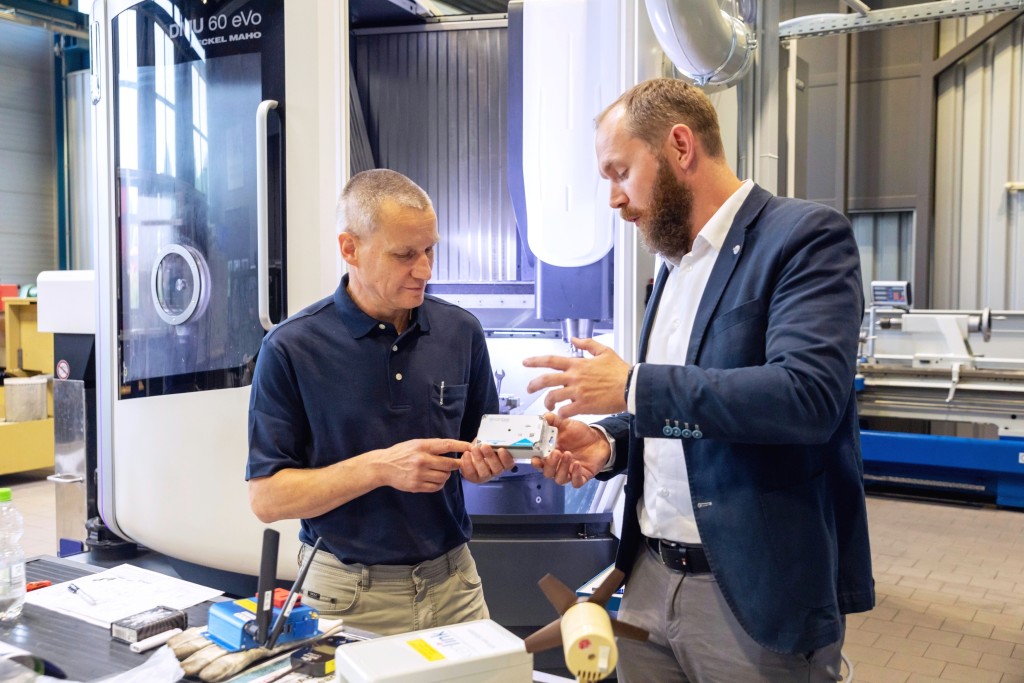Martin Strube is a specialist in the Industrial Internet of Things and the intelligent
networking of sensors, devices, and machines; the expertise of the mathematician Frank Klawonn is
in statistics and machine learning. In the research area Digitization and Industry 4.0 at Ostfalia
the two professors play an important role. In this interview, they explain why the industry
benefits from the collaboration with them and how they also support medical practice. And they talk
about the reasons why research in digitization is so fascinating.
Professor Strube, Professor Klawonn, why is it important that you support companies in
Digitization and Industry 4.0?
Martin Strube: Digitization is not a product that companies can buy commercially. Nor is there a
manual that entrepreneurs can consult in order to establish Industry 4.0 in their production. In
the machine and plant construction companies, there are countless different combinations of
machines, IT systems and software solutions. This is what makes it so difficult to digitally
represent the entire process chain from the delivery of materials up to delivery of the finished
product – and in fact this is the goal of digitization. In principle, each company needs its own
Industry 4.0 solution.
Frank Klawonn: The human factor also plays a role. Each employee has his or her own way to
process data. Bringing together these data from different jobs and from different fields requires a
lot of detail work, energy, and expertise. The digitization of production means a great deal of
effort and only works if companies really resolve to gain data and to integrate and evaluate
it.
Martin Strube: In this context I’d like to quote my colleague Professor Diederich Wermser, who
says: Digitization is, first of all, a different way of thinking and only then the use of new
technologies. If we want to network the company thoroughly, there must be an understanding of the
objectives of Industry 4.0 in every department, and also of the way the company wants to implement
digitization.
What can you and your colleagues accomplish in your field of research?
Martin Strube: With feasibility studies we can demonstrate the added value of new technologies
such as cyber-physical systems to industry partners. A simple example: if a production plant is at
an unscheduled standstill, it can lead to high costs. It is better to evaluate your data
intelligently in order to obtain advance information on the wear and tear of machines and to avert
an impending loss of production. We show businesses which steps they need to take in order to
achieve this level of development.
Frank Klawonn: We can help businesses to capture data, to recognise patterns in them and to make
predictions for the production. This is the case – as in the example of the predictive maintenance –
in the industrial environment and also in many other areas.
In which other areas is digitization being used?
Frank Klawonn: For example, in medicine: I use data so that rare diseases can be diagnosed
earlier. We make a faster therapy possible for people and spare you what might be a years-long
odyssey to physicians.
What is your research work based on?
Frank Klawonn: On the fact that data in digital form are available almost everywhere today. From
these data we can draw useful information – with mathematical, computationally intensive procedures
supported by technologies. Generally, companies can always derive important findings from the
collaboration with us.
Why is your field of research well-positioned?
Martin Strube: We are in the fortunate position that the professors and their teams have a lot
of practical experience, and each is specialised in a link in the process chain. Therefore, it is
possible for us to analyse the overall process in an organisation.
Frank Klawonn: Automation, wireless technology, data analysis: these skills could not be unified
even in a universal genius, it takes several experts. The cooperation between us works
wonderfully.
Where is the cooperation between you particularly important?
Frank Klawonn: For data protection. How can the data securely make their way from the sender to
the addressee? How can we guarantee the protection of the patient about whom the data reveals
information? In the medical field these are the important questions. Data protection and data
security is the expertise of my colleague Professor Ina Schiering: she ensures that we are on the
safe side.
Why is Digitization and Industry 4.0 an ideal field of activity for industry and research?
Martin Strube: Computing technology, sensors and transfer technology form a fascinating
combination that not only is very powerful but also relatively cheap. The investments are
relatively low and the probability is high that companies will quickly realise additional value. In
digitization, we are doing pioneering work in many cases because the technologies are very
new. This is fun – not only in industry, but also in research.


